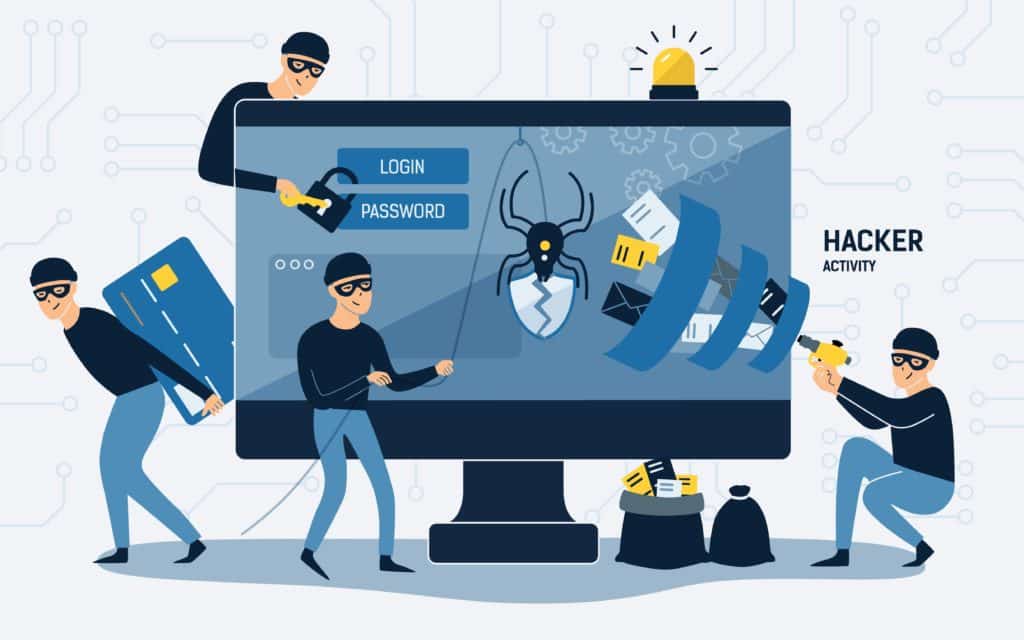
Cybercrime is a frightening reality, especially in developed nations where people depend on the internet for various personal and professional activities. It is responsible for annual losses amounting to trillions of dollars.
Cybersecurity is crucial because organizations, enterprises, and governments require trustworthy security to conduct their online operations. Getting an education is necessary for success in this job path, as is venturing out to build your network. In this article, we talk about the industry and outline the merits of a career change to cyber security.
What is Cyber Security?
Cyber security, also called cybersecurity, information security, or IT security, is the practice of protecting sensitive data and critical digital infrastructure from malicious attacks.
With an increasing number of people working from home, governments, and industries digitizing records, and businesses shifting their assets online, cyber attacks have the potential to do a great deal of damage.

Cybercriminals taking control of energy industry assets could cripple essential infrastructure across a city or region, digital attacks on financial institutions could see millions of dollars lost, and a data breach at a government database could threaten national security.
The very real need for robust information security measures has led to rapid growth and development in the cyber security space, now a booming industry with a worldwide shortage of qualified cybersecurity professionals.
Why Should You Consider a Career in Cybersecurity?
With organizations and government agencies actively investing in new ways to combat cybercrime, the IT security space is extremely dynamic, with new roles emerging all the time.

The number of cybersecurity jobs is projected to increase exponentially over the coming years, and IT decision-makers in large corporations are already struggling to fill open cybersecurity positions due to a shortage of qualified cyber security professionals with the necessary technical skills.
With the threat of cybercrime not going away any time soon, now is the time to acquire the specialized skills and knowledge to become a cybersecurity professional and ensure a secure career path in this rapidly growing industry.
Another reason to consider learning about modern cyber security innovations is that employers today are partial to candidates with knowledge of cybersecurity issues, even if the position doesn’t directly deal with information security.
Hiring staff who understand how to keep themselves safe from digital attacks is a great way to secure the organization through the ranks.
Reasons to Pursue a Career in Cyber security
One of the primary advantages of having cyber security skills is that you will be in high demand from employers. Because there is a significant shortage of talent in this industry, firms must constantly compete for the best employees. Let’s take a closer look at the main reasons to consider getting into cybersecurity.
Cybersecurity Is One of the Fastest-Growing Career Fields in the Country
The US Bureau of Labor Statistics projects a 31-percent increase in the number of available cybersecurity jobs by 2029, which is almost eight times faster growth than the national job growth of 4 percent, while this cybersecurity jobs report predicts 3.5 million job openings by 2025.
Professionals currently filling an IT role or individuals with core IT skills should consider diversifying and acquiring the knowledge and skills to become cybersecurity professionals.
Cybersecurity Offers Unlimited Growth Opportunities
A career in cybersecurity can be extremely challenging and engaging, and the lack of highly skilled cybersecurity professionals offers limitless opportunities for growth within the field. The growing demand for cybersecurity industry professionals means that unemployment rates are minimal to zero, and getting an entry-level cybersecurity job is relatively easy.
Driven individuals with a strong interest in information security can start off in the field as a cybersecurity analyst, incident responder, or similar junior position and quickly work their way up to becoming highly-paid cybersecurity specialists or even the chief information security officer.
Cybersecurity experts can also take advantage of the growing demand for their specialized knowledge and skills to negotiate compensation aggressively.
Cybersecurity Is Essential to a Secure Digital Future
We are well and truly in a digital age, and as digitization spreads across all major industries and their processes, the field of cybersecurity continues to grow. The world around is evolving at a rapid pace, influenced by cutting-edge technologies, and cyber security is crucial for businesses to conduct online activities safely around the world.

Cybersecurity activities must evolve and adapt to the diverse requirements of businesses adopting the latest systems and methodologies, such as cloud computing, automation, artificial intelligence, and more.
The area of information security is constantly expanding into a wide variety of focus areas to keep up with emerging technologies and provide businesses with the peace of mind and security necessary for a smooth digital transformation. This allows cybersecurity professionals to specialize in vastly different areas, and why the industry is always expanding and evolving.
A Cybersecurity Career Change Offers a Great Deal of Variety
Cybersecurity is constantly growing and evolving to match innovations in the IT and tech industries and meet the requirements of businesses as they modernize their processes.
The field of cybersecurity hence covers several domains, and while a newcomer to the industry may start a career in cyber security as an entry-level system administrator or a junior cybersecurity analyst, they can subsequently gather expertise and get certified to fill a wide variety of roles across various information security domains.
The potential opportunities in the cybersecurity field are limitless. Based on your areas of interest and experience, a good cyber security course could prepare you for a variety of roles, including that of a network security analyst, information security analyst, digital forensics expert, penetration tester, vulnerability assessor, cybersecurity architect, and more.
Candidates could choose to focus on one or more of the various cybersecurity domains, including critical infrastructure security, network security, and risk management, application security, cloud security, data protection, disaster recovery, storage security, and mobile security.
With such a diverse range of possible career options currently available within the cyber security field, there is little chance of ending up in a boring job or getting stuck in a rut. The best part is that the industry is still growing and developing, with new roles and core security technologies constantly emerging.

A Career in Cybersecurity Offers Great Earning Potential
With the growing demand for qualified cybersecurity professionals and the obvious applications for their skills and knowledge in almost every industry today, positions in cybersecurity pay rather well, even at entry-level roles.
Salaries for a basic IT security administrator or digital forensic examiner start at just over $70,000 annually, while a junior cybersecurity analyst, penetration tester, cybersecurity consultant, or information security analyst can earn over $80,000 a year.
Moving up the ranks, a certified ethical hacker can bring home upwards of $90,000 a year working with a cybersecurity firm, while cybersecurity managers, security architects, and security engineers cost their employers between $100,000 and $150,000 a year.
Commit to a cybersecurity career, make it all the way to the top as an organization’s chief information security officer, and you can demand an annual pay packet of over $150,000.
How to Start a Career in Cybersecurity?
A successful cybersecurity career should be built on a strong foundation of IT industry expertise, including networking knowledge, an understanding of various operating systems, coding basics, and more. With a cybersecurity degree, you can pursue a variety of career paths. Let’s take a closer look at the career training and relevant skills that could boost your cybersecurity career even before you earn your certifications.
Networking and System Administration
An understanding of computer networking is essential for any cybersecurity role. Networking deals with the technical aspects of data transmission and being well versed with networking technology is the first step towards keeping sensitive data secure.
System administration is another important area to focus on for budding cybersecurity professionals. This deals with computer configuration and maintenance and can provide valuable insights into the machine’s many features and settings.
Operating Systems
As a cybersecurity professional, you will need to know your way around various operating systems and their specific nuances and understand the advantages and limitations of each.
Get comfortable with Windows, Mac OS, and Linux to begin with, and proceed to get hands-on with Kali Linux, which is equipped with hundreds of information security tools that can be used for security research, penetration testing, digital forensics, and more.
Coding
Basic knowledge of popular coding languages can open a wide range of opportunities in the field of cybersecurity. Basic coding skills can help you identify and fix vulnerabilities, solve cybersecurity problems, and better understand how malicious software works.
Prominent coding languages that could play an important part in your cybersecurity career include C, C++, Python, JavaScript, HTML, and SQL.

Blockchain
Blockchain technology is growing in popularity due to the high levels of security it offers. Familiarize yourself with how blockchain mitigates internet security risks, as it is sure to play a critical part in the future of cybersecurity.
The Internet of Things
The Internet of Things (IoT) is the ever-expanding network of physical objects embedded with sensors, software, computing power, and the ability to interact and exchange data. These include smart devices, appliances, vehicles, and even homes, with popular estimates indicating that we could have well over 40 billion IoT-connected devices worldwide by 2025.
Many IoT devices generate and collect massive amounts of personal data and can access networks independently of human oversight, making network security and integrity extremely important to prevent misappropriation or misuse of this data.
It’s vital to keep up with these and other developing technologies because AI and automation are revolutionizing many industries, including cybersecurity.
Artificial Intelligence and Automation
Cutting-edge technologies like artificial intelligence (AI) and automation are finding applications in various fields, including cybersecurity.
AI-equipped cybersecurity measures can help security analysts reliably and consistently identify fraudulent activity, while automated cybersecurity systems can respond to digital threats much faster and more efficiently than any human.
Cybersecurity is just one of the many industries in which AI and automation are transforming, so it’s a good idea to stay on top of these and other emerging technologies.

FAQs
Is Cybersecurity a Good Career Change?
The time is now to diversify into cybersecurity if you are on an analytical career path in IT and are searching for exciting work prospects inside the IT sector. It is a quickly developing industry with a critical shortage of qualified personnel, good pay and career advancement opportunities.
What Are the Benefits of a Career in Cyber Security?
Cybersecurity is one of the fastest-growing career fields in the country, with the possibility to take up diverse roles and an expected 3.5 million job openings by 2025. Securing an entry-level cybersecurity position is relatively easy since the demand for qualified candidates is steadily increasing, and growth opportunities are limitless. To top it off, cybersecurity jobs pay quite well.
How Do I Change My Career to Cybersecurity?
If you already have some IT industry experience under your belt, you are in a great position to acquire a relevant cybersecurity certification in the form of an associate, bachelor’s, or master’s degree program. Once certified, getting a cyber security job should be relatively easy.
Is Cybersecurity a Secure Career?
Most definitely, yes. With high pay and job security, cybersecurity is an excellent career path. Career opportunities in cybersecurity are growing every day, with various new roles and job options emerging due to widespread digitization and advancements in technology.
Conclusion
With the amount that the modern world depends on digital technology and the need to always be ‘connected,’ cybersecurity is set to play a critical role in the ongoing digital revolution. Exploring a future in cybersecurity can present you with immense career opportunities in a booming field with the potential for long-term exponential growth.
The New England Institute of Technology offers various degree programs such as Associate degrees, Bachelor’s degrees, and Master’s degree certifications in cybersecurity that could qualify you for a wide variety of positions in the field. Reach out to learn more about cybersecurity education requirements and to determine which program is best suited to your specific interests.

